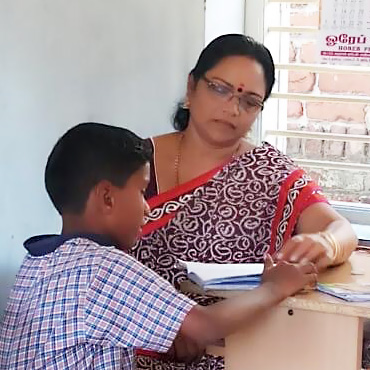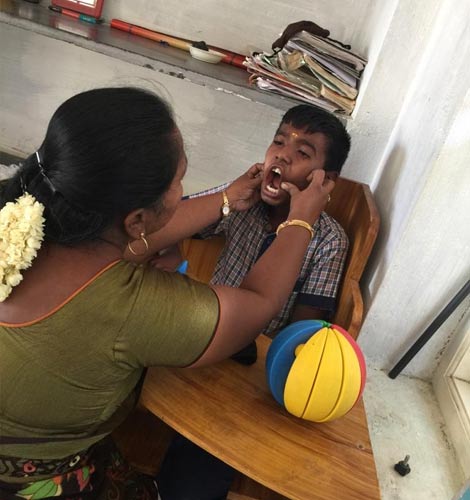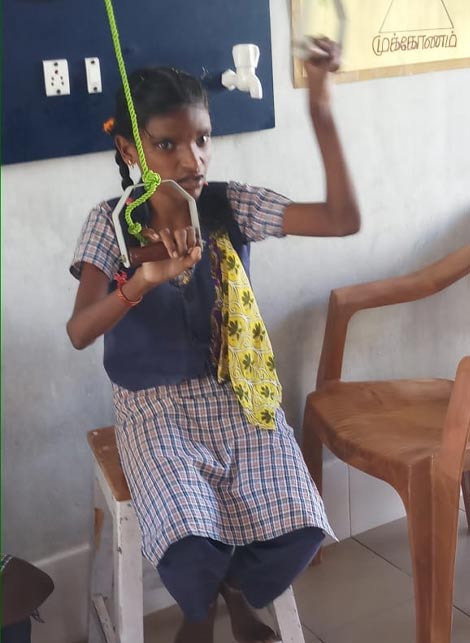
Special education aims to address the unique educational needs of students with disabilities through specialized materials and teaching methods. We currently care for children who have Down syndrome, Autism Spectrum Disorder, ADHD, MR, and Mentally Challenged conditions. We are using an age-appropriate, activity-based, functional curriculum. We aim to help our students achieve the goals to prepare them to live independently. There are different classes for students based on their disabilities and ages.
Different teaching techniques are used by special education teachers to promote learning. Students with disabilities may benefit from individual instruction, problem-solving exercises, and small group instruction. Every child has an Individualized Education Programme (IEP) developed by the teacher. The IEP sets personalized goals for each student and is tailored to the student’s individual needs and ability.

Shyam Special School Center is working with an experienced Speech Therapist. They visit the center on a need-to-know basis every two weeks. To assist the students in need, therapists are engaged to provide Speech Therapy and involve parents in the exercises. For students with speech, language, and communication difficulties, speech therapy is provided. It increases the confidence of children in verbal communication.
The main goal of these lessons is to improve the ability of children to comprehend and express lexical items, vocabulary, communication skills, articulation, and speech intelligibility. Every child has specific goals based on their performance level. Various forms of therapy are offered, including individual and group sessions.

Children with cerebral palsy receive physiotherapy. At Shyam Special School, we have a team of experienced and qualified physios, who visit Special Schools every week and whenever necessary. They evaluate the physical state of each child and develop a program that suits the needs of each child. The program includes balance, strength, coordination activities, toys, games, or other special equipment. We encourage our students to walk steadily and stand up straight.
Physios educate families about the problem of the children and give them the skills to help the child become independent. Shyam Special School has a state of art physiotherapy center, with essential equipment such as physioball, parallel bar, steps, wall ladder, custom walkers, specialized seating systems, standing frames, static cycle, trampoline, treadmill, and vibrator, etc. Professional visitors from abroad who have expertise in various physiotherapy fields are also provided training for the school's staff.

In occupational therapy, children who have difficulty with everyday tasks are given the skills they need to function effectively. Occupational therapists work closely with children, their families, schools, and other healthcare professionals. A disruption in function in one or more of the following areas may require occupational therapy:

Children with autism have different sensory experiences. Their response is usually stuck in repetitive flight, fight, or freeze modes. This results in blood getting diverted to the skeletal system from the digestive system. This leads to disrupted digestion, shallow breathing, and a faster heart rate. They experience anxiety as a result.
Yoga for Autistic Children – At the Institute, we teach Yogendra Pranayamas that are easy to follow. We practice abdominal IV pranayama and other relaxation methods like Shavasana, Nisphanda Bhava. Mindfulness can be incorporated into yoga actions and breathing to teach children and their caregivers compassion and self-awareness. These techniques all work to calm down the children.
Yoga techniques help children concentrate and sit still for a longer period. Meditation helps them clear their minds of clutter. Positive songs and music help them to stay positive.

Cooking classes are great for disabled people. It can be an excellent respite from the stresses of everyday life by providing fun and friendship. Students can gain inspiration from cooking classes by trying new dishes and foods from around the world.
People often lack confidence when it comes to food preparation, which leads them to avoid it. This is particularly true if the kitchen is not well-suited to a disabled person's needs, or if a person's disabilities make it difficult to do tasks such as using sharp knives or lifting hot, heavy pans. Cooking classes specifically designed for people with disabilities provide a safe and nonjudgmental environment in which to learn. Cooking classes for disabled people encourage good nutrition and can improve mental health.